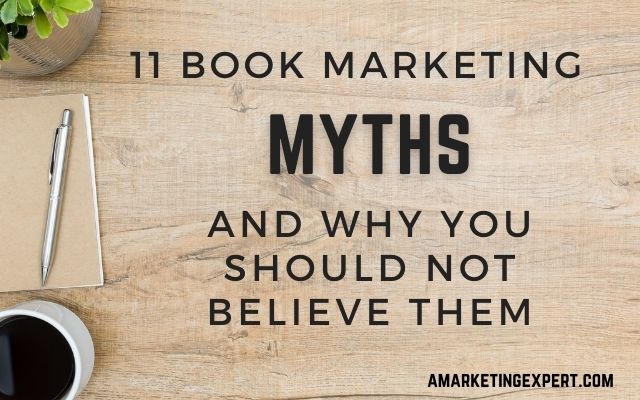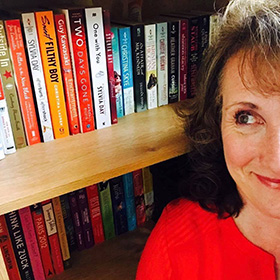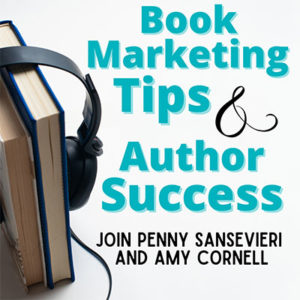When it comes to how to sell books, there’s a lot of information out there. Especially information on book marketing for self-published authors. Some of it is great – but some of it isn’t. I thought it might be time to address some of the things I hear a lot, and give you the real skinny on what works, and what doesn’t when it comes to promoting your book!
How to Sell Books to Your Friends and Family (Who Will Buy Lots of Copies of My Book!)
I lead with this because it’s something that I hear a lot: I have a bunch of people I know who will buy my book. Maybe it’s a mailing list, maybe it’s your neighbors, or in some cases, it might be family. What’s interesting is that this often doesn’t happen – or the numbers are far smaller than you’d expect.
So why is that? Well it’s not because family and friends don’t want to support you, but people get busy, or they forget. Or maybe it’s not the kind of book they’d read. If you’re relying on a mailing list to spur on sales that’s great, but an active buying mailing list takes work to develop. You can’t just expect to drop your book link into a newsletter and sell lots of books. This really takes some strategic planning, maybe a special limited time offer if they get your book on launch day, that kind of thing.
The point being, don’t lead off your book marketing campaign depending on these sales to nudge you up the bestseller list because you might be disappointed!
Just Copy Other Successful Authors to Be Successful!
Book marketing for self-published authors (or traditionally published authors!) can seem daunting. And I’ll be honest, I’m a little torn on this because success does leave clues. So while I’m a fan of modeling (to a certain extent) what another successful author has done for their book, it’s also important to make it your own.
Also, marketing strategies are genre-specific. What I’d do for a business book is vastly different from what I’d do with a crime noir thriller. So while learning from other, successful authors is important, you also have to put your stamp on it and make it your own.
You Should Pursue a Traditional Publisher so They’ll Do All of Your Book Marketing
This might be my all-time favorite myth actually. And nothing could be further from the truth. I mean no disrespect to traditional publishing, at all, but they release a lot of titles each season and their publicist is pretty busy. And yes, I said publicist – singular. In some cases, it’s one publicist person managing as many as 75 titles. So don’t get caught in the: “I’ll wait to get a publisher because I don’t want to do my own book marketing.” – trap. No matter how you publish, you should always be engaged in your own success.
Don’t Share Your Story Ideas or Someone Will Steal Them
Most people don’t have time to steal your story. If someone asks me to sign an NDA before I read their book I will, but literally, I have no inclination or time to steal a book idea. In my 20+ years in business, I’ve yet to hear from an author that they had their book idea stolen.
The problem that happens is authors find themselves stuck between sharing their book topic and keeping mum. If you’re getting close to your campaign date, the book is almost ready to come out, share it far and wide.
Posting About Your Book on Social Media Is an Effective Way to Market Your Book
I wish this was true, it would make figuring out how to sell books so much easier. Social media is a branding tool, it helps to create more impressions with your potential buyer. But it does not always make them buy. Engaging readers in a thoughtful, interesting, or helpful way is a good way to build their interest because that’s where it starts. If they aren’t interested in you or your topic, they aren’t going to be interested in your book.
Being on social media is great and helpful when it comes time for book marketing for self-published authors, but that doesn’t mean you have to be on every social media channel. Don’t be everywhere, just everywhere that matters, and then spend the time engaging with your reader.
The same is true for running ads. I spoke with an author who wanted to run a Facebook ad (boosting a post) to get more interest for the stuff she was putting up there. There’s nothing wrong with that, per se, but be clear on your goals before you start investing in ads because an ad just to run an ad, or get more likes – won’t necessarily sell your book. It just adds to your post likes, and if that’s your end goal that’s great. But ads don’t usually push book sales unless you have a great offer, like a limited-time discount or a gift with purchase.
Author Websites Don’t Matter
A lot of authors just want to live on Facebook. They’ll tell me “that’s all I need for a website, right?” Well, not exactly. Facebook can be a great tool, but you should always have a place for your readers to visit you – and that place is your website.
And even though most of us never get our social media accounts pulled, it should always be a consideration. Meaning that while you want to invest your time in a social media platform, you don’t want that to be the only way readers can find you online. Because if it vanishes, there goes your online presence. Always have a website, even if it’s a really basic three-page site.
Blogging Is Dead
With the popularity of video and now audio (think: Clubhouse and podcasting), it would be easy to think that blogging is just a thing of the past. And while blogging has been around a lot longer than podcasting has, and certainly even longer than YouTube, it’s still a great tool. Not just to talk to your (potential) readers, but also to help optimize your website for online visibility and traffic.
This doesn’t mean you have to be blogging daily. We post a couple of blogs a week, but many well-known SEO (search engine optimization) experts say that if you write thoughtful, long-form posts, once a month can greatly help your online exposure. And this can be an invaluable tool when it comes to book marketing for self-published authors.
Book Awards Boost Book Sales
First off, I adore book awards. I’ve judged a few and love it. So don’t misunderstand, I really love book awards but in and of themselves, they aren’t sales generators. Let me explain.
When you win an award, or a notable mention, it’s great. But so often authors don’t go beyond that. Meaning they don’t announce it to their mailing list or add it to their websites or Amazon book pages. They don’t share it on social media. That’s like having an influencer email you a great review of your book and you doing nothing with it. Book awards are tremendous but if you’re going to take the time to enter be sure that you also have time to do something with the award or honorable mention you get.
Book Blog Tours Sell Books
There’s no one thing that sells books, unfortunately. Life would be so much easier if that was true. Blog tours are great for exposure to the right markets, but in and of themselves they don’t sell books. Why? Because you need multiple impressions to sell books. So as one of your many strategies, it can be great (if the right blogs are being pitched), but as a singular piece, it may not have the kind of impact you’d expect.
In general, book marketing pieces should never be done in a vacuum. Pair a blog tour with another great strategy, like some Goodreads promotion, pitching Amazon reviewers, or polishing your media pitches for more exposure.
A Book Trailer Will Help Me Sell More Books
Book trailers can be awesome, visual additions to your marketing campaign, but much like blog tours it rarely happens that they move the needle. They can, however, entice readers enough to get them to want to know more – and that’s kind of the point of any of your marketing, really. At a minimum, that should be the goal.
The issue with the majority of book trailers is they are too long, or too convoluted to capture (and keep) the attention of the reader. If you look at trailers for upcoming shows, most of us know – in the first ten seconds, if that’s a show we’re going to watch. Book trailers that take too long to get to the point, or don’t lead with a bang, or some issue that’s being dealt with, or the reader benefit, won’t do much for your book sales.
Wait Until the Book Is Published to Start Marketing
If you want to know how to sell books, this is not it. I have no words for how problematic this one is. Sadly, it’s often easy to subscribe to this. Authors get busy and there’s so much to consider, the process of preparing for your marketing can also be confusing. So they wait, and wait, and wait and before you know it, your book is six months old.
Sometimes it happens that stuff gets in the way. A lot of authors found that during the pandemic, they lost a lot of traction when it came to book marketing. Does that mean you should give up? Absolutely not, but your marketing will look different as your book ages. The older your book gets, the harder it will be to market for sure – hard, but not at all impossible.
Still, if you can avoid this marketing delay you’ll be in much better shape. Even a 90-day ramp-up is great, and sometimes that’s really all we have. Longer lead-ups get complicated. How much should you share about your book if it’s not even up for pre-order yet? Which is a great question to ask. So find something that’s a happy medium. If you don’t have a big following, if it’s your first book – you don’t need a huge early marketing window to reap your book marketing rewards!
Book marketing myths aren’t always myths, per se. Sometimes they’re just misunderstood concepts and ideas. Don’t let them sink your book or tank your momentum. I’ve known authors to sink 20,000 dollars into a book trailer that got them barely a whisper in book sales. When it comes to book marketing for self-published authors, making smart choices is one of the most important decisions you’ll make!
Resources and Free Downloads
Book Marketing Kickstart Package
Amazon Cheatsheet
The Biggest Mistake Authors Make When Self-Publishing a Book (Book Marketing Podcast)
How to Promote a Book on Social Media without Burning Out (or wasting a ton of time)
Check out KM Weiland’s site, she’s an excellent resource


![Stay with me here: the best book marketing campaigns include social media AND it is also true that social media doesn’t sell books. Wait, what? Isn’t that a contradiction? You’d think so but here’s the thing: social media is an important key to exposure, and exposure sells books. Let me rephrase that: the right kind of social media sells books. Which is why I always say it’s not about being everywhere, but everywhere that matters. There are a lot of different angles to consider with social media platforms, and you can get deep into which platform is best for your purposes as well as all kinds of analytics that can guide when and where you post. These are all worthy topics for advanced study. Today we’re going back to basics as we consider the best book marketing campaign for you. Today’s post, in fact, is all about helping you answer a question many authors struggle with: what the heck am I supposed to post? Authors often hop on social media sites without any idea of the demographic of the platform’s users, with no knowledge of their own reader demographic, and without the faintest idea of what to say – and then they wonder why social media doesn’t seem to be working for them. That is not the right way to approach social for your best possible book marketing campaign; not only is it wrong, but that approach will cost you a bunch of time and effort that you literally will never get back. Where Does Your Message Live on Social? Most of the time, social media frustration stems from authors struggling with the content they feel they should be posting. In response to the feeling that they should be active on social media, they post something that’s not really relevant to their audience, though maybe it’s top of mind. But the problem actually starts earlier than that because more often than not, authors are on the wrong social media site to begin with. I’m including a link to a social media quiz you can take, to determine the best site for you (see the Resources section below). And if you take the quiz and you’re sitting here thinking “Well great, I’m on all the wrong social media sites, what do I do now?” My answer is: close down what you don’t need. If you keep the account, you’ll be tempted to update it, and that’s not a good use of your time. If you keep the account and don’t update it, it looks like you’ve abandoned your own party, and that’s not a good look either. Creating a Rockin’ Social Media Presence It’s fair to say that each social media site has its own particular “needs” – LinkedIn, for example, is different than Facebook, which is different from Instagram or Twitter. But regardless of where you’re going to spend your time, you’ll want to make sure to do a little bit of prep work before you start posting. Authors with the best book marketing campaigns work on identifying the talking points that will work best for them and for their books. To make this easy, I recommend you find three or four tracks you will speak to. These “tracks” are the conversation funnels you share on social, and the reason I like to limit those tracks is that a narrower course makes it easier for you to figure out what to say and/or share. Generally what happens is authors hop onto social and share whatever comes to mind, which creates a somewhat erratic presence and, invariably, lowers your engagement. What you’re attempting to do here is set your reader expectations by pre-plotting your pathways and the things you share. This doesn’t mean that you’re always tied to just four talking points, but to get started and kick this into high gear, you’re better off staying on track. And, by staying consistent to your messaging and your posting topics and schedule, you’ll build a reader/follower base much more quickly than you would if you just got onto social media in a haphazard way or if you posted too much one day and then nothing at all for a week. Most of what happens on social media falls into one of those two scenarios. So what does this look like in the best book marketing campaigns? Let’s say you’ve written a diet and health book; your tracks might look like this: • Latest health news • Quick daily health tip • Exciting news about your book • Motivational quote around health/wellness/diet If you’ve written a fiction book, let’s say a Sci-Fi novel, your tracks might look like this: • Fun science fiction did-you-know • Throwback to old Sci-Fi novels, shows, or films • Exciting news about your book • Book research you’re doing for future books OR • Some insight into your life: where you write, the playlist you listen to when you write, etc. OR • Your hobbies and what you love to do besides writing We worked with an author who set one of her romance novels in a small town, so she shared recipes from the various restaurants and coffee shops she wrote about, and readers really enjoyed this creative twist. She tried to create an immersive experience because she knew that was what her readers really cared about. So, along those lines you could share cocktail recipes or anything that tethers to the world you’ve created. Here are some other ideas: • Get your followers’ help in naming a pet in your next book. • Even better, get their help naming a character! • Ask questions to get to know your followers better; people love it when you ask about hobbies or movies they love. • Talk about things you like besides books. • Make yourself unique. • Share things that are specific to your genre – for example, if you wrote a book on vampires, you could create a meme with four famous movie vampires and ask readers to pick their favorite. • Celebrate your favorite comfort food or something else that dials into your topic. The idea is to find where readers want to engage – meaning posts that will (in the words of Marie Condo) spark joy with your followers. This may take a while. Start with your three or four discussion tracks but know that you may need to play around a bit and further refine them. The Best Book Marketing Campaigns Create Connections Readers love getting to know the authors of the books they read and love. Often, authors post on social and then wait for folks to engage with them, and yes, a bit of that approach can be part of your social platform mix. But also know that the degree to which you are connected to your posts matters, and it matters a lot. If you’re posting and ditching, you won’t get good engagement – ever. After you post, you need to check back to see if anyone responded; sometimes it just takes one person response, followed by your own, to get the comments rolling. Humans desire social approval; we love to express ourselves on social media in the hope of getting affirmative feedback. Likes and shares give our brains a surefire dopamine rush. We also love contributing and having our opinions heard – keep this in mind even if you’re just posting something funny. For example, I do a lot of “caption this” posts to spark communication. Some of them do really well, garnering upwards of 150 comments, while others only get 20 or so comments. Regardless of how many responses I get, I make sure to acknowledge every single one. People love it when you take the time to get to know them, when you’re really interested and willing to take the time to connect. Inviting followers to share their hobbies and then responding – or even just giving their content a thumbs up – can go a long way in developing reader relationships. Another driver of engagement is nostalgia, though you need to know your audience well enough to make it work for you. Someone who grew up in the 1990s won’t necessarily feel nostalgic for the same post as someone who grew up in the 1970s. People also love humor, especially now. So posting funny things might be one of your tracks. As I said before, you’re going to want to play around with this a bit until you find the right mix. Branded Images The best book marketing campaigns use images that are consistent in color, font, and message. You may share a meme that’s not specifically branded to you, which is fine. But the majority of your images should be consistent with your brand as this helps to create a visual recognition; readers see something and say, “Oh that looks like [insert author name]!” You can create branded images using an online service like Canva. In fact, for AME’s blog images (which get shared on social), we create a series of templates so that we can swap images in and out, but the standard font, spacing, and URL stay the same. Canva is an easy way to quickly create content, too. Create a Posting Calendar The best book marketing campaigns rely on planning. Not everything you do has to be planned ahead of time, but keeping up with your social media obligations will be a lot easier – and quicker! – if you create a posting calendar so you know what you’re sharing and when. Once your plans are in place, you might also spend some time creating images ahead of your posting dates and then scheduling them to post. This allows you to really focus on marketing strategies like book giveaways so you aren’t caught off guard when your chosen date crops up. Staying the Course Social media takes time. You’ll try something and succeed, then try something else and fail. This is how you learn what resonates with your audience, and what does not. Before long, you’ll start to see why social media plays such an important role in the best book marketing campaigns. And you might even start to discover some real joy along the way! Resources and Free Downloads Canva Monthly Book Marketing Planner Book Marketing Kickstart Package QUIZ: How to Market Your Book on Social Media](https://amarketingexpert.com/wp-content/uploads/2020/06/CTAs-3.png)



What I’d do for a business book is vastly different from what I’d do with a crime noir thriller.